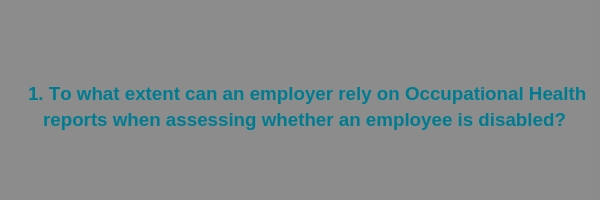Our Monthly Employment Law Updates provide a summary of some of the most important cases, helping our clients and contacts to stay up-to-date on recent case law developments.
June’s Employment and HR update covers the following;
- To what extent can an employer rely on Occupational Health reports when assessing whether an employee is disabled?
- Court of Appeal overturn previous decision on unlawful inducements to employees
- Non-disclosure agreements in discrimination cases
- Should regular voluntary overtime be included in the calculation of holiday pay?
- Perceived disability

In the case of Kelly v Royal Mail Group Ltd, the Claimant had a poor attendance record during the course of his employment and had triggered his employer’s Attendance Policy on numerous occasions. The Claimant then underwent surgery for Carpal Tunnel Syndrome and was absent from work, triggering the final stage of his employer’s Attendance Policy and his dismissal.
The Claimant brought a claim for unfair dismissal and disability discrimination.
The Employment Tribunal (‘ET’)
The ET held that the decision to dismiss the Claimant was fair and that the employer did not know and could not reasonably be expected to know that the Claimant had a disability and dismissed both claims.
The Employment Appeal Tribunal (‘EAT’)
The Claimant appealed the Tribunal’s decision. One of the grounds for the appeal was that the Tribunal erred in finding that the employer had properly considered the question of disability given they had only relied solely on the Occupational Health reports.
The Court of Appeal judgement from 2013 in the case of Gallop v Newport City Council told us that although an employer should correctly seek assistance and guidance from an Occupational Health Report (or other medical expert), it is for the employer to make a factual judgment as to whether or not the employee is disabled and cannot simply “rubber stamp” an external opinion.
The EAT dismissed the Claimant’s appeal, stating that when considering the employer’s reliance on the Occupational Health reports, the employer had given consideration to the question of disability in light of all the information available to them, and in the absence of any other evidence provided by the Claimant, the employer was entitled to attach considerable weight to the opinions contained within the Occupational Health reports when assessing whether the Claimant was deemed to be disabled.
Lesson for Employers:
This decision is positive for employers as the preceding case law held that reliance could not solely be placed upon Occupational Health reports when determining disability. Now employers are able to take Occupational Health report advice on whether the employee is disabled or not at face value unless there is other evidence which contradicts the assessment and further investigation is then required.

The Court of Appeal has overturned the Employment Tribunal (‘ET’) and Employment Appeal Tribunal (‘EAT’) judgements that an employer had breached trade union regulations by directly approaching workers with a pay deal and making “unlawful inducements”.
In Kostal UK Ltd v Dunkley and others, the employer had been negotiating with the trade union over its employees’ terms and conditions in their contracts of employment. As negotiations reached a standstill, the employer sent letters to its employees directly, asking them to agree to a pay deal that had previously been rejected by the trade union and effectively by-passed the collective bargaining process. The letter stipulated that if the pay deal was not accepted, the employees would not get their Christmas bonus.
The law states that an employer is not allowed to make offers to members of a recognised trade union for the purposes of undermining collective bargaining by the union. The union therefore claimed that the letters sent by the employer amounted to an unlawful inducement aimed at undermining collective bargaining.
The EAT upheld the decision given in the ET and found that Kostal had offered unlawful inducements to its employees by making direct offers to them and bypassing collective bargaining with the trade union. The company was ordered to pay a substantial fixed penalty to each affected employee (totalling around £420,000).
Kostal UK Ltd appealed this decision and argued that the financial risk to employers meant that unions would have the prevailing right to reject any changes to an employees’ terms or conditions of employment. The Court of Appeal found in favour of Kostal UK Ltd and overturned the earlier decisions of the ET and EAT. They agreed that the ET’s earlier decision was too broad an interpretation of the legislation and would give a recognised trade union the power to reject any direct offer to an employee in relation to even the most minor changes to their employment terms and conditions. This could result in employers incurring a severe financial penalty for implementing any changes the union had rejected.
Lesson for Employers: This judgement will be welcomed by employers with unionised workforces. If it had gone the way of the employee then it could have potentially had very costly future consequences for businesses who wanted to approach employees directly if collective bargaining had come to a standstill. Employers with unionised workforces should still be mindful that when seeking to change their employee’s terms and conditions, they should seek agreement with the union first and should only approach employees directly if negotiations with the union are not progressing.
Following this decision from the Court of Appeal, the union has confirmed its intention to seek permission to appeal to the Supreme Court so it looks like it will not end here!

Following their recent inquiry into sexual harassment in the workplace, the Women and Equalities Select Committee (‘WESC’) have recently published a report on the wider use of non-disclosure agreements (‘NDAs’) in discrimination and harassment cases and have put forward their recommendations to the Government.
The WESC have commented how the imbalance of power between employers and employees can result in employees feeling like their only option is to sign a Settlement Agreement that has been drafted to contain tight confidentiality provisions, prohibiting the employee from discussing their allegations openly.
The report shines a light on the alleged misuse of NDAs and how they have allegedly been routinely used by some employers to cover up discrimination and harassment. The WESC have commented how this ‘cover-up culture’ has to be challenged as it fails to protect employees as all allegations should be investigated properly as opposed to simply being covered up.
The report makes a number of recommendations for Government which include:-
- ensuring NDAs can’t prevent genuine discussions about allegations of unlawful discrimination and harassment
- requiring standard confidentiality clauses within Settlement Agreements and for them to be drafted using plain English
- tighter requirements on businesses to meet their responsibilities to protect their workers from discrimination and harassment and the implementation of sanctions for poor practice
- the employer being required to pay the full cost for the legal advice the employee is required to obtain before entering into a Settlement Agreement and to pay further contributions if the employee wants to negotiate the confidentiality clauses within the agreement. It was also recommended that the legal advice given to the employee should include the nature and limitations of the confidentiality clauses within the agreement and disclosures the employee is able to make
- the need to consider and review the support available to litigants in person (individuals who do not have legal representation) as cases can be complex
- extending the time limit for bringing a discrimination claim from 3 months to 6 months in claims of sexual harassment or pregnancy or maternity discrimination
- the appointment of senior managers within businesses, at board level or similar, to oversee anti-discrimination and harassment policies and procedures and the use of NDAs in discrimination and harassment cases.
Lesson for Employers: The report highlights some genuine areas of concern in situations where NDAs are misused, however many employers would argue that they use them appropriately and they are a crucial tool to ensure confidentiality. It will be interesting to see the Government’s response following the report’s recommendations.
If you would like to read the full report or summary notes, they can be found here:

Yes, according to the ruling given by the Court of Appeal in Flowers and others v East of England Ambulance Service NHS Trust, where it was held that voluntary overtime should be taken in to account when calculating an employee’s holiday pay if the voluntary shifts are regular enough.
The Claimants brought a claim in the Employment Tribunal (‘ET’) for unlawful deductions from their holiday pay and argued that their holiday pay should take in to account non-guaranteed and voluntary overtime they typically work, and that this should be regarded as their normal remuneration.
Non-guaranteed overtime was incurred when their shift overran and they were expected to complete a job (the employer had no obligation to provide the overtime but if offered, the employee was obliged to take it) and voluntary overtime consisted of voluntary shifts the employees chose to take in advance.
The ET concluded that non-guaranteed overtime should be taken in to account when calculating holiday pay, however, voluntary overtime did not form part of the employees’ normal remuneration as volunteering for additional shifts was not a contractual obligation.
The decision was appealed and the EAT held that voluntary overtime did from part of an employees’ normal remuneration if it was paid over a sufficient period of time and therefore should be taken in to consideration, alongside non-guaranteed overtime, when calculating holiday pay. The EAT did however refer the Claimants back to the ET for individual assessment as to whether the voluntary overtime was frequent enough to be considered part of normal remuneration.
The Trust appealed to the Court of Appeal, who upheld the EAT ruling that voluntary overtime could be considered normal remuneration if undertaken often enough.
Lesson for Employers: This case is another reminder for employers that they should be mindful when calculating holiday pay as to what could be considered to be ‘normal remuneration’. It is now well established case law that overtime paid over a sufficient period of time can be ‘normal remuneration’ and in those circumstances must be taken into account in the calculation of holiday pay and the case law has now developed to voluntary overtime when undertaken in the above circumstances.

In the case of Chief Constable of Norfolk Police v Coffey, the Court of Appeal have upheld the EAT’s earlier ruling in favour of the Claimant, confirming the legal test for direct discrimination due to perceived disability had been correctly assessed.
Under the Equality Act 2010, direct discrimination occurs when an employer treats an employee less favourably due to one or more of the protected characteristics (age, disability, gender reassignment, marriage and civil partnership, pregnancy and maternity, race, religion or belief, sex and sexual orientation).
In the above case, the Claimant was a police officer and suffered from hearing loss and tinnitus that did not have a detrimental impact on her job and was not deemed to be a disability under the Equality Act 2010. For someone to be deemed as disabled under the Equality Act they must:-
- have a physical or mental impairment and
- the impairment must have a substantial and long-term adverse effect on their ability to carry out day-to-day activities.
The Claimant’s hearing functionality was slightly outside the range set by the Home Office for her role, but she had passed a practical functionality test and successfully worked on the front line as a police officer for Wiltshire Constabulary.
The Claimant applied for a transfer to Norfolk Constabulary and informed them of her hearing loss. Following the Claimant’s health assessment, Norfolk police refused the transfer as her hearing fell just outside the standard set for recruitment and they were concerned that it would substantially impact her ability to perform in her role.
The Claimant was successful with her claim for direct disability discrimination in the ET, claiming she had been treated less favourably due to a perceived disability as opposed to having an actual disability. The Tribunal commented that Norfolk Constabulary failed to follow Home Office advice to carry out an assessment on the Claimant’s abilities and concluded that she had been unlawfully discriminated against on the grounds of perceived, actual or potential disability.
Norfolk Constabulary appealed this decision but the EAT upheld the ET’s earlier ruling, commenting that the Constabulary should not have rejected the Claimant’s application on the basis that she would not be capable of performing her duties satisfactorily.
Norfolk Constabulary appealed to the Court of Appeal, but the appeal was dismissed. The Court commented that it was accepted that an act will be deemed to be direct discrimination if someone thinks another person has a protected characteristic and treats them unfavourably based on this perception, even if they do not have this protected characteristic in reality (known as ‘perception discrimination’). They also stated that the Chief Inspector of Norfolk Constabulary had not considered that the definition of disability also included progressive conditions that may not cause significant problems now but are likely to in the future. The Court of Appeal concluded that it was unlawful to reject the Claimant’s application as she was able to fully perform her duties as a front line police officer at the force she was already part of.
Lesson for Employers: This decision is helpful for employers as it provides guidance as to when perceived disability discrimination may occur and highlights that care should be taken when assessing an employee’s suitability for roles as a condition that may not be deemed to be a disability now could potentially be categorised as such in the future.
For more information, please contact Tom Evans: tom.evans@dtmlegal.com/ 0151 230 1217







